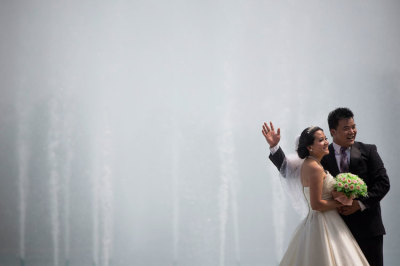Churches Should Shift Priorities From Defending to Re-teaching Marriage, Say ERLC Conference Panelists

A panel of Christian leaders sounded off on the current state marriage and the distorted view young adults have of its meaning at the Ethics and Religious Liberty Commission's National Conference held this week in Nashville.
Today's generation has "a romanticized vision and understanding of marriage where marriage is just basically the government's affirmation of romantic love between two willing people and some sort of commitment there," said Trevin Wax, managing editor of The Gospel Project.
Wax declared that this definition is not only dominate in popular culture, but "I think that sort of reduced understanding of marriage is already prevalent in evangelical churches."
The panelists explained that the only way to counter this "reduced understanding" is for churches to start teaching and re-teaching what love and marriage means in the context of the Bible and society.
"It's time to start rebuilding marriage. Stop talking about defending it and rebuild it," John Stonestreet, a fellow of the Chuck Colson Center for Christian Worldview, told conference goers. "There's not much left to defend on a cultural level."
Though polls have shown that many singles desire to be married, the panelists agreed the romanticized belief of what marriage is has led many young adults to avoid commitment and delay marriage.
Lindsay Swartz, manager of Christian women's resource blog TrueWomen.com, explained that many young adults are so fixated on finding romantic love that they are afraid to "pull the trigger" because "they don't want to commit to something because something better might come along and they don't want to settle."
Children of divorced parents also tend to delay marriage, Stonestreet said.
He opined "I think one of the reasons why marriage has declined is because you do have some well-intentioned Millennials who have been through the trauma – and they'll use that word – trauma of divorce when they were kids who don't want to make that mistake. The irony is though they ramp up the romantic new definition of marriage in the process of trying to avoid that – so we're going to co-habitat ahead of time, we'll give this a trial run, we're going to post-pone and delay here until we're absolutely sure that whatever romantic longings and feelings we have for each other is going to be good enough to sustain us over the long haul. So instead of seeing that part of the divorce culture came about from this (romanticized) re-definition of marriage, they're actually clinging even fiercer to that redefinition as they're trying not to repeat the mistakes of their parents."
Those who are married have no concept of the social and personal responsibilities that come with the union, he said. Wax noted that among older generations, marriage was "oriented towards procreation" as well as family stability and the common good. Newer generations, he believes, have moved away from that notion and are more private.
"The destruction of our understanding of marriage and family has real consequences for our kids, our economy and for the future of society as a whole." said Eric Teetsel, executive director of the Manhattan Declaration. Teetsel said scientific studies shows children do best in a home with a biological mom and dad. When children are raised under a different set of circumstances, Teetsal said it costs taxpayers "billions and billions of dollars" to subsidize those broken families.
Panelists agreed the solution is better teaching. Wax admonished church leaders for not reaching out to singles in their congregations. "We now live in a culture where I think the stats [now show] more people are single then are not single especially in a lot of urban environments, especially when you look at younger generations. The church has been slow to really wrestle with that reality because that's not what we have prepared for," he said.
Both Swartz and Stonestreet urged the church to give young adults a view of faithful, long-lasting marriages. "I would just tell churches to teach it and model it and invite singles in and young married couples too and pray for it," advised Swartz.
"One of the things we do in church is we divvy out everybody out by generation," Stonestreet said. "One way to model (successful marriage)t is to put together generations."
Stonestreet, Wax, Swartz and Teetsel were panelists for a talk entitled "Millennials And Marriage: Evaluating The Younger Generation's Views On Sexuality And Marriage" held on Monday, the first day of the three-day conference. The discussion was one of several discussions about the gospel, homosexuality and the future of marriage hosted by the ERLC National Conference.




























